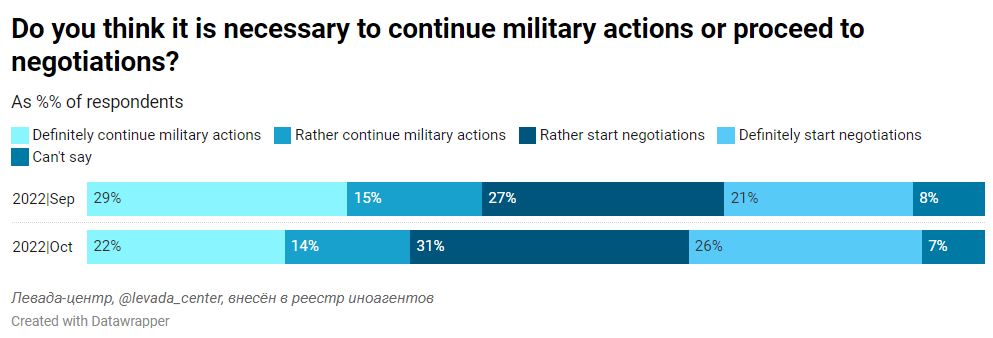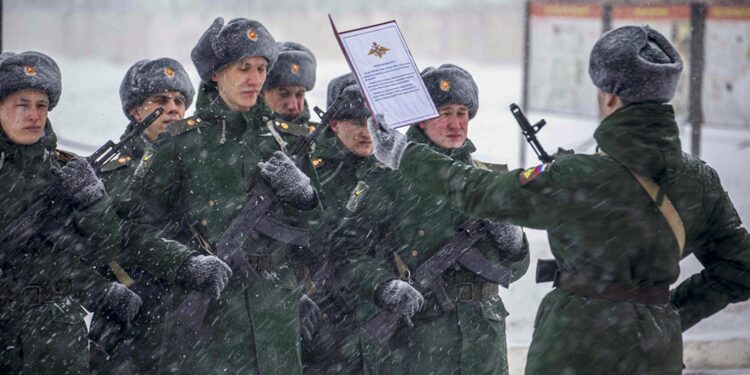Russian popular support for continuing the war in Ukraine is becoming increasingly fragile, according to a November opinion poll conducted by “Putin’s Praetorian Guard”, the Federal Protective Service, and leaked to Meduza. Overall, only 25% of respondents said they were in favour of continuing the war, versus 55% who were in favour of negotiations. This is in stark contrast to polling conducted in July, in which 57% were in favour of continuing the war, and only 32% in favour of peace talks. But this is roughly in line with the corresponding question asked by the Levada Center in October:

It’s important to put this into context. There is still overwhelming support in Russia for the military’s actions in Ukraine (73%), which might at first seem contradictory, but which merely suggests the desire for peace talks versus continued fighting arises from pragmatism and concern for an army they support.
The reasons for this concern aren’t hard to imagine. The “partial mobilisation”, which followed the disastrous rout from the Kharkiv region in September, is clearly one. Mobilisation, in Russia, turned out to be a euphemism for the shambolic rounding up of fighting-age men, who often had to provide much of their own food and equipment before being bussed off to Ukraine and told by drunken and inept commanders to advance on Ukrainian positions without adequate weaponry or clothing, or huddle in freezing and hastily-dug trenches to die of hypothermia. Advancing Russian troops have been easy targets for Ukrainian indirect fire and drone-dropped grenades, and at Bakhmut in particular (where Wagner PMC and its cadre of ex-convicts has also been heavily involved), the treatment of Russian soldiers as “single use” weapons has been horrific but also pitiful to the point where – paraphrasing Ovid – even the goddess Hera might have thought it a bit rough.
Yet, despite much heavy fighting and repeated attacks in some areas, there has been no Russian breakthrough. The retreat from Kherson and the widespread failure to make any gains, combined with the dawning realisation that Russia is losing, is likely the second reason for this shift in public opinion.
In an attempt to shore up support for the war, Putin recently put on a charade where he met some hand-picked stooges acting the part of mothers of Russian soldiers (who have traditionally been held in special regard by Russian society). During the meeting, Putin made a strange remark – but one that I think probably struck home. He reflected on the hopelessness of many Russian men, implying that it was better to be killed in Ukraine than succumbing to alcoholism inside Russia. And while in some societies alcoholism might fuel the caustic wit of a Christopher Hitchens or even make Country music appealing, the sheer pointlessness and misery of life in many of Russia’s remote towns and villages has produced nothing more than a few Darwin Awards. At least those killed in Ukraine died for a cause, Putin can say. Although, contrary to the earlier claim that the parents of fallen soldiers would be rewarded with enough money to buy a Lada, recent reporting suggests the winnings from this particularly deadly form of Russian roulette might now amount to just three towels and a card.
A recent focus group study, also conducted by the Kremlin in secret and leaked to Meduza, revealed that the tone of many respondents has changed to one of sullen withdrawal. “Leave us alone,” they seemed to be saying – we’re sick of hearing about it. As before, this suggests to me a genuine and deep dissatisfaction with the conduct of the war – which as patriots they would like to support, but which is becoming increasingly difficult.
However one slices it, little is likely to change as a result of these studies. Russians may be coming to the conclusion that the war isn’t going well (and also that things are getting worse inside Russia), and may wish for negotiations, but Ukraine knows full well that while Russian troops are on its soil, any kind of cease-fire – Putin’s aim in seeking negotiations – would only allow Russian forces to fix their gains and give them time to regroup before resuming hostilities at a time of their choosing.
And while it may be notable that it’s the Russian equivalent of the U.S. Secret Service doing this polling, indicating that the Kremlin at least pays some attention to public opinion, nevertheless Putin won’t be voted out of office, and no-one in a position to challenge him has any desire to embark on an exciting but brief career as a window quality control inspector. So as before, the West needs to continue to provide support for Ukraine and its valiant armed forces, but this half-hearted support – which balks at providing Western tanks and aircraft – needs to turn into total support, so as to help Ukraine bring this to an end as soon as possible. For this to happen, the myth that Russia would escalate to the use of battlefield nuclear weapons – which supposedly alarmed China, leading to the U.S. preventing the supply of aircraft to Ukraine – needs to be understood as such. Until then, the very real consequences of this increasingly desperate act of Russian aggression – at times reminiscent of both Stalingrad and the trenches of World War I – will continue to mount up, in terms of completely unnecessary deaths on both sides.












To join in with the discussion please make a donation to The Daily Sceptic.
Profanity and abuse will be removed and may lead to a permanent ban.
Bit confusing calling it conversion therapy. Isn’t that when you try to convert people from something they are to something they are not? But aren’t a lot of these men trying to convert themselves to women?
Abu Humza is an islamist – he will support anything that helps to destabilise western countries.
If my kids were afflicted by this spiritual illness no law would stop me from rescuing them.
This is war.
“…a law that could see ordinary Christians criminalised for merely expressing their beliefs.”
What is Humza Yousaf’s religion? What are Ms Sturgeon’s political beliefs
It’s useless to read the article because its entirely devoid of details, it just contains some people’s interpretations and opinions of the unknown particulars.
NB: I’m perfectly happy to be convinced that these interpretations and opinions are correct, however, I’m not willing to accept that without being convinced of it.
I think this is something which has been known for a while now but perhaps is not common knowledge; the link between Gender Dysphoria and Autism Spectrum Disorder.
”A natural question is: could ASD and GD be linked? While the epidemiology of both conditions is not well developed, several papers have reviewed the available evidence and have found a link. Van Der Miesen et al, in a narrative review concluded that about 20% of GD patients indeed have ASD.
So the next time there is a news story on transgender rights, surgical advancement, hormone therapy, and psychological outcomes, keep in mind that autism is likely playing a role in the interpretation of what is portrayed to the public.”
https://petermcculloughmd.substack.com/p/autism-spectrum-disorder-and-gender
Gender dysphoria is a condition vulnerable people get talked into by political activists. And autistic kids are a prime example of such vulnerable people.
Garbage.
We hate autists (because they’re different) and really want to blame them for everything we also don’t like! is almost as common as We hate Germans [and …]! As someone who happens to be a member of both groups, I’m willing to tolerate this nonsense because I can’t change it. But that’s not a melody I’m going to go along with and you’re more than invited to keep all your bizarre sexual perversions to yourself.
So nobody’s sexual desires or behaviour should be suppressed? Gary Glitter will be pleased.
Yes, I know that’s not what the author meant… The point is that the law already makes certain acts illegal. Like assaulting people to ‘change’ them or to force sexual practices on them.
And if coercion is illegal then what the hell has been going on for the past few years?
The Scots who have been voting for the SNP when they fell out of love with New Labour were really just looking a for an anti Tory party instead of labour. They found one in the SNP, and overnight were all suddenly convinced they wanted “Independence”, even though they had never wanted it before. ——–But this gender stuff will be the knitting needle in the balloon for the SNP. ——-Scots can decide they don’t want Tories, and decide they don’t like Westminster, but this gender garbage is NOT what they will put up with for the sake of that.
Sexual desires change, even gay activists like Peter Tatchell (he has expressed the belief most will be bi in a few decades – judging by Gen Z he could be right!) and Camille Paglia readily admit it. Prof Lisa Diamond’s research demonstrates degrees of fluidity. Desire is not some fixed, genetic trait. There are many sexual desires, homosexuality is just one. It can change by changed perceptions. If someone wants to try to lessen homosexual desire through counselling, prayer therapy etc to preserve his marriage or stay healthy (from HIV, Hep B & C, STDs – all much commoner in gays) then why should he not have the right?